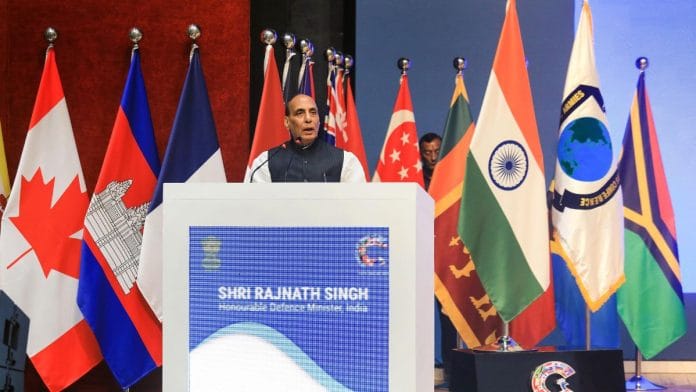New Delhi: Defence Minister Rajnath Singh on Tuesday called for “collective efforts” to deal with the complexities of the Indo-Pacific, and ensure a future marked by prosperity, security and inclusivity in the region.
In an address at the 13th Indo-Pacific Armies Chiefs’ Conference (IPACC), Singh pointed out that states must recognise that global issues involve multiple stakeholders and no one country can address these challenges in isolation.
His comments came amid growing global concerns over China’s aggressive military behaviour in the Indo-Pacific.
The defence minister said peace and prosperity in the Indo-Pacific can be achieved in consonance with the ancient Indian ethos of ‘Vasudhaiva Kutumbakam’ (The world is one family).
Delegates from over 30 countries are attending the conference being hosted by the Indian Army.
Singh emphasised that the Indo-Pacific is no more a maritime construct, but a full-fledged geo-strategic construct, and the region is facing a complex web of security challenges, including boundary disputes and piracy.
He explained his vision for the region through a theoretical model by American author Stephen R Covey, which is based on two circles — ‘Circle of Concern’ and ‘Circle of Influence’.
“There may be instances when the ‘Circle of Concern’ of different nations overlap with each other. International maritime trade routes passing through high seas, beyond the exclusive economic zones of any country, are relevant examples,” he said.
“This can either result in conflict between nations or they can decide to coexist by mutually deciding the rules of engagement. The concept of these circles underscores the importance of strategic thinking and prioritisation,” he added.
Singh pointed out that states must recognise that global issues involve multiple stakeholders and no one country can address these challenges in isolation.
He stressed the need to engage with the broader international community and work collaboratively through diplomacy, international organisations and treaties to tackle common concerns within the overlapping ‘Circle of Concern’.
He termed the United Nations Convention on the Law of the Sea (UNCLOS), 1982 as a good example of such an international agreement that establishes the legal framework for maritime activities and addresses the issues arising from overlapping ‘Circle of Concern’ of different nations.
Singh was of the view that states, at the same time, must identify and seek to expand their ‘Circle of Influence’ to promote national interests on the global stage.
This, he said, may involve building partnerships, participating in regional organisations and employing diplomatic, economic or military tools strategically.
“This conference is an exercise where we all are trying to expand our ‘Circle of Influence’ while harmonising the overlaps of our ‘Circle of Concern’,” he added. PTI MPB DV DV
This report is auto-generated from PTI news service. ThePrint holds no responsibility for its content.
Also read: India-Canada diplomatic row will not impact military ties: Canadian Army Vice Chief






